University Health Policy: My Health Record Risk Analysis Report
VerifiedAdded on 2022/08/22
|7
|1490
|18
Report
AI Summary
This report presents a risk analysis of My Health Record (MHR) in Australia, examining potential risks, their impacts, and associated consequences. The analysis focuses on security breaches, data confidentiality, and the impact on minors and vulnerable populations. The report highlights the potential for loss of patient trust, healthcare disparities, and financial losses. A risk analysis table is provided, assessing the likelihood and consequence of identified risks. A risk management plan is proposed, including measures to enhance data security, protect minor's privacy, and improve access for diverse populations. The report concludes by emphasizing the need for robust risk management strategies to ensure the effective and equitable implementation of MHR within the Australian healthcare system. The report also touches upon how the MHR system aligns with universal healthcare principles.
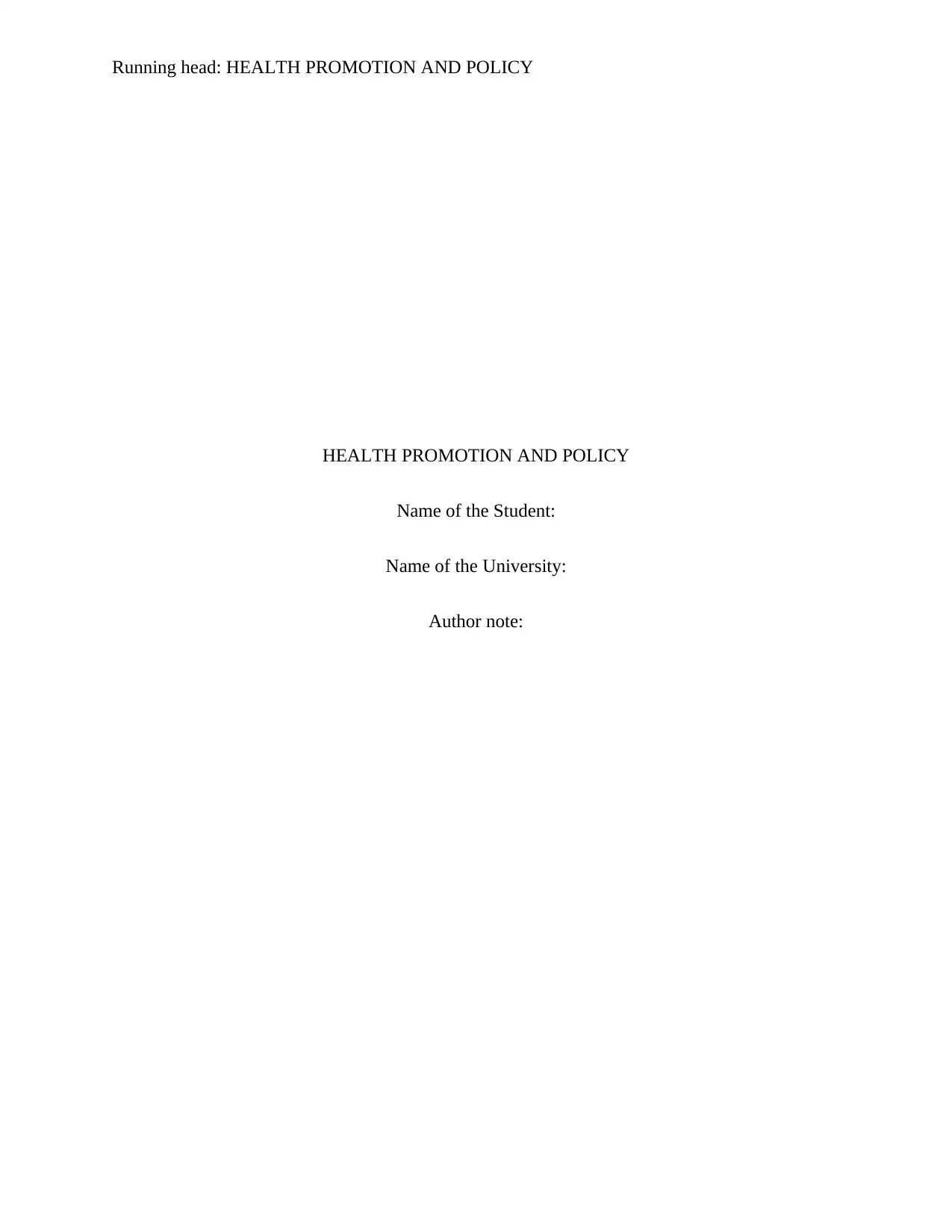
Running head: HEALTH PROMOTION AND POLICY
HEALTH PROMOTION AND POLICY
Name of the Student:
Name of the University:
Author note:
HEALTH PROMOTION AND POLICY
Name of the Student:
Name of the University:
Author note:
Paraphrase This Document
Need a fresh take? Get an instant paraphrase of this document with our AI Paraphraser
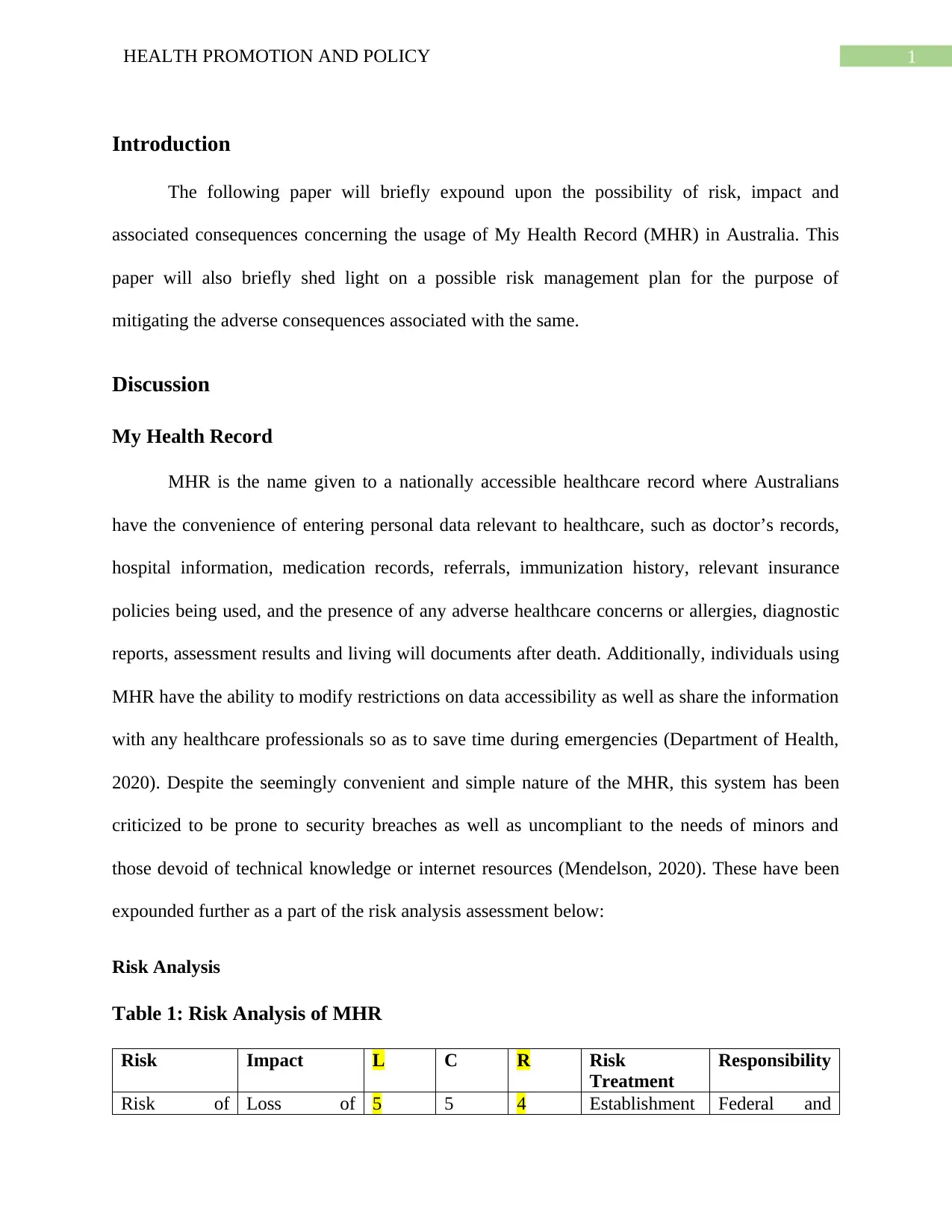
1HEALTH PROMOTION AND POLICY
Introduction
The following paper will briefly expound upon the possibility of risk, impact and
associated consequences concerning the usage of My Health Record (MHR) in Australia. This
paper will also briefly shed light on a possible risk management plan for the purpose of
mitigating the adverse consequences associated with the same.
Discussion
My Health Record
MHR is the name given to a nationally accessible healthcare record where Australians
have the convenience of entering personal data relevant to healthcare, such as doctor’s records,
hospital information, medication records, referrals, immunization history, relevant insurance
policies being used, and the presence of any adverse healthcare concerns or allergies, diagnostic
reports, assessment results and living will documents after death. Additionally, individuals using
MHR have the ability to modify restrictions on data accessibility as well as share the information
with any healthcare professionals so as to save time during emergencies (Department of Health,
2020). Despite the seemingly convenient and simple nature of the MHR, this system has been
criticized to be prone to security breaches as well as uncompliant to the needs of minors and
those devoid of technical knowledge or internet resources (Mendelson, 2020). These have been
expounded further as a part of the risk analysis assessment below:
Risk Analysis
Table 1: Risk Analysis of MHR
Risk Impact L C R Risk
Treatment
Responsibility
Risk of Loss of 5 5 4 Establishment Federal and
Introduction
The following paper will briefly expound upon the possibility of risk, impact and
associated consequences concerning the usage of My Health Record (MHR) in Australia. This
paper will also briefly shed light on a possible risk management plan for the purpose of
mitigating the adverse consequences associated with the same.
Discussion
My Health Record
MHR is the name given to a nationally accessible healthcare record where Australians
have the convenience of entering personal data relevant to healthcare, such as doctor’s records,
hospital information, medication records, referrals, immunization history, relevant insurance
policies being used, and the presence of any adverse healthcare concerns or allergies, diagnostic
reports, assessment results and living will documents after death. Additionally, individuals using
MHR have the ability to modify restrictions on data accessibility as well as share the information
with any healthcare professionals so as to save time during emergencies (Department of Health,
2020). Despite the seemingly convenient and simple nature of the MHR, this system has been
criticized to be prone to security breaches as well as uncompliant to the needs of minors and
those devoid of technical knowledge or internet resources (Mendelson, 2020). These have been
expounded further as a part of the risk analysis assessment below:
Risk Analysis
Table 1: Risk Analysis of MHR
Risk Impact L C R Risk
Treatment
Responsibility
Risk of Loss of 5 5 4 Establishment Federal and
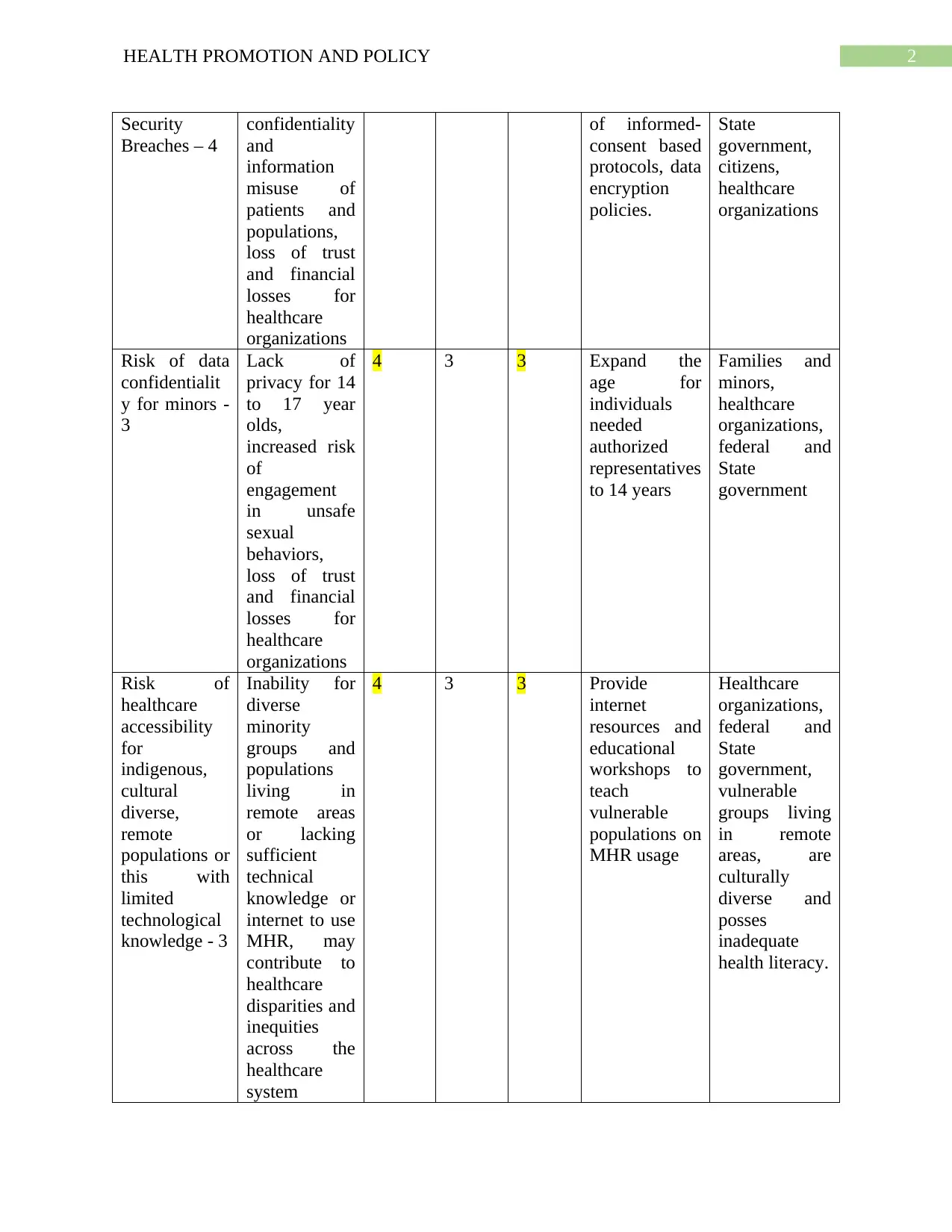
2HEALTH PROMOTION AND POLICY
Security
Breaches – 4
confidentiality
and
information
misuse of
patients and
populations,
loss of trust
and financial
losses for
healthcare
organizations
of informed-
consent based
protocols, data
encryption
policies.
State
government,
citizens,
healthcare
organizations
Risk of data
confidentialit
y for minors -
3
Lack of
privacy for 14
to 17 year
olds,
increased risk
of
engagement
in unsafe
sexual
behaviors,
loss of trust
and financial
losses for
healthcare
organizations
4 3 3 Expand the
age for
individuals
needed
authorized
representatives
to 14 years
Families and
minors,
healthcare
organizations,
federal and
State
government
Risk of
healthcare
accessibility
for
indigenous,
cultural
diverse,
remote
populations or
this with
limited
technological
knowledge - 3
Inability for
diverse
minority
groups and
populations
living in
remote areas
or lacking
sufficient
technical
knowledge or
internet to use
MHR, may
contribute to
healthcare
disparities and
inequities
across the
healthcare
system
4 3 3 Provide
internet
resources and
educational
workshops to
teach
vulnerable
populations on
MHR usage
Healthcare
organizations,
federal and
State
government,
vulnerable
groups living
in remote
areas, are
culturally
diverse and
posses
inadequate
health literacy.
Security
Breaches – 4
confidentiality
and
information
misuse of
patients and
populations,
loss of trust
and financial
losses for
healthcare
organizations
of informed-
consent based
protocols, data
encryption
policies.
State
government,
citizens,
healthcare
organizations
Risk of data
confidentialit
y for minors -
3
Lack of
privacy for 14
to 17 year
olds,
increased risk
of
engagement
in unsafe
sexual
behaviors,
loss of trust
and financial
losses for
healthcare
organizations
4 3 3 Expand the
age for
individuals
needed
authorized
representatives
to 14 years
Families and
minors,
healthcare
organizations,
federal and
State
government
Risk of
healthcare
accessibility
for
indigenous,
cultural
diverse,
remote
populations or
this with
limited
technological
knowledge - 3
Inability for
diverse
minority
groups and
populations
living in
remote areas
or lacking
sufficient
technical
knowledge or
internet to use
MHR, may
contribute to
healthcare
disparities and
inequities
across the
healthcare
system
4 3 3 Provide
internet
resources and
educational
workshops to
teach
vulnerable
populations on
MHR usage
Healthcare
organizations,
federal and
State
government,
vulnerable
groups living
in remote
areas, are
culturally
diverse and
posses
inadequate
health literacy.
⊘ This is a preview!⊘
Do you want full access?
Subscribe today to unlock all pages.

Trusted by 1+ million students worldwide
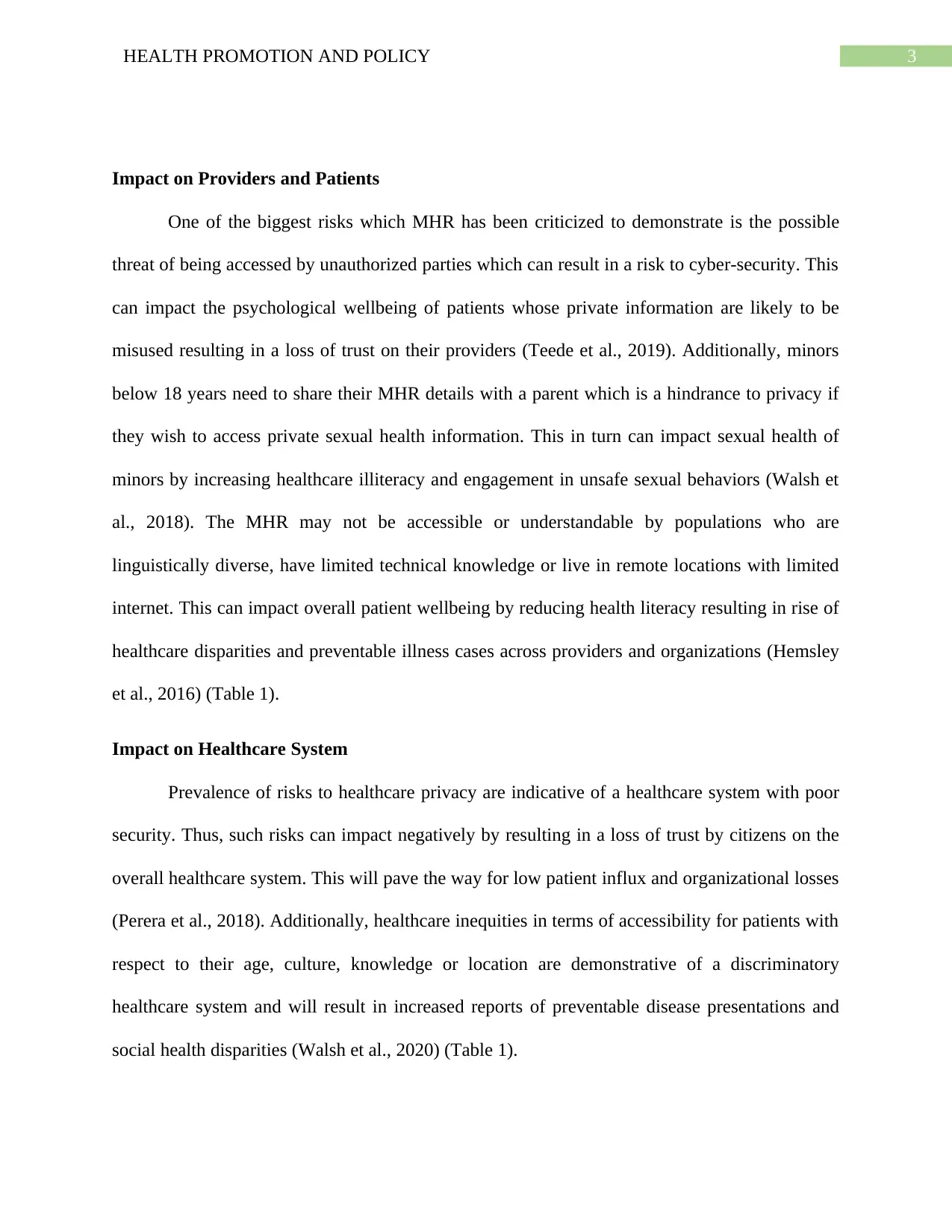
3HEALTH PROMOTION AND POLICY
Impact on Providers and Patients
One of the biggest risks which MHR has been criticized to demonstrate is the possible
threat of being accessed by unauthorized parties which can result in a risk to cyber-security. This
can impact the psychological wellbeing of patients whose private information are likely to be
misused resulting in a loss of trust on their providers (Teede et al., 2019). Additionally, minors
below 18 years need to share their MHR details with a parent which is a hindrance to privacy if
they wish to access private sexual health information. This in turn can impact sexual health of
minors by increasing healthcare illiteracy and engagement in unsafe sexual behaviors (Walsh et
al., 2018). The MHR may not be accessible or understandable by populations who are
linguistically diverse, have limited technical knowledge or live in remote locations with limited
internet. This can impact overall patient wellbeing by reducing health literacy resulting in rise of
healthcare disparities and preventable illness cases across providers and organizations (Hemsley
et al., 2016) (Table 1).
Impact on Healthcare System
Prevalence of risks to healthcare privacy are indicative of a healthcare system with poor
security. Thus, such risks can impact negatively by resulting in a loss of trust by citizens on the
overall healthcare system. This will pave the way for low patient influx and organizational losses
(Perera et al., 2018). Additionally, healthcare inequities in terms of accessibility for patients with
respect to their age, culture, knowledge or location are demonstrative of a discriminatory
healthcare system and will result in increased reports of preventable disease presentations and
social health disparities (Walsh et al., 2020) (Table 1).
Impact on Providers and Patients
One of the biggest risks which MHR has been criticized to demonstrate is the possible
threat of being accessed by unauthorized parties which can result in a risk to cyber-security. This
can impact the psychological wellbeing of patients whose private information are likely to be
misused resulting in a loss of trust on their providers (Teede et al., 2019). Additionally, minors
below 18 years need to share their MHR details with a parent which is a hindrance to privacy if
they wish to access private sexual health information. This in turn can impact sexual health of
minors by increasing healthcare illiteracy and engagement in unsafe sexual behaviors (Walsh et
al., 2018). The MHR may not be accessible or understandable by populations who are
linguistically diverse, have limited technical knowledge or live in remote locations with limited
internet. This can impact overall patient wellbeing by reducing health literacy resulting in rise of
healthcare disparities and preventable illness cases across providers and organizations (Hemsley
et al., 2016) (Table 1).
Impact on Healthcare System
Prevalence of risks to healthcare privacy are indicative of a healthcare system with poor
security. Thus, such risks can impact negatively by resulting in a loss of trust by citizens on the
overall healthcare system. This will pave the way for low patient influx and organizational losses
(Perera et al., 2018). Additionally, healthcare inequities in terms of accessibility for patients with
respect to their age, culture, knowledge or location are demonstrative of a discriminatory
healthcare system and will result in increased reports of preventable disease presentations and
social health disparities (Walsh et al., 2020) (Table 1).
Paraphrase This Document
Need a fresh take? Get an instant paraphrase of this document with our AI Paraphraser
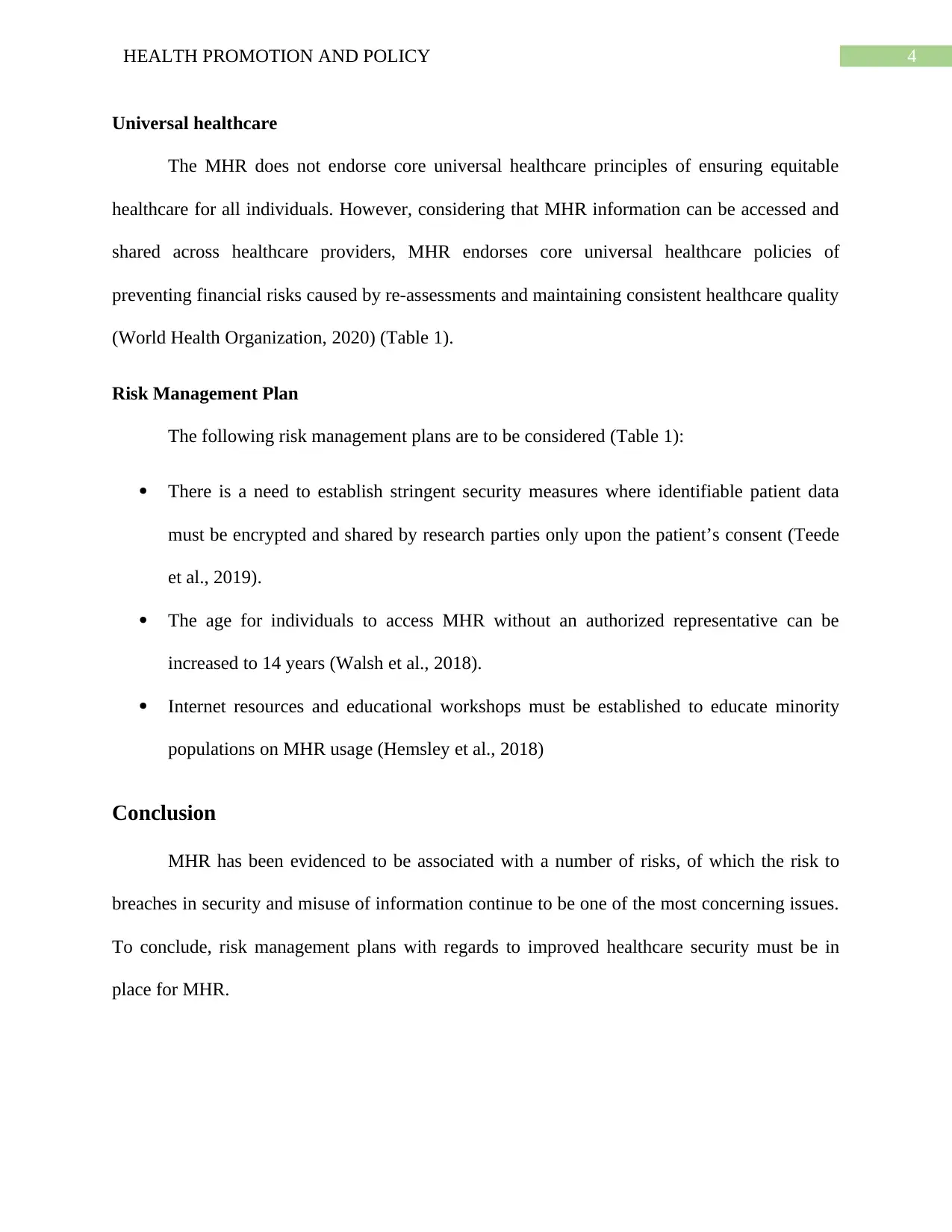
4HEALTH PROMOTION AND POLICY
Universal healthcare
The MHR does not endorse core universal healthcare principles of ensuring equitable
healthcare for all individuals. However, considering that MHR information can be accessed and
shared across healthcare providers, MHR endorses core universal healthcare policies of
preventing financial risks caused by re-assessments and maintaining consistent healthcare quality
(World Health Organization, 2020) (Table 1).
Risk Management Plan
The following risk management plans are to be considered (Table 1):
There is a need to establish stringent security measures where identifiable patient data
must be encrypted and shared by research parties only upon the patient’s consent (Teede
et al., 2019).
The age for individuals to access MHR without an authorized representative can be
increased to 14 years (Walsh et al., 2018).
Internet resources and educational workshops must be established to educate minority
populations on MHR usage (Hemsley et al., 2018)
Conclusion
MHR has been evidenced to be associated with a number of risks, of which the risk to
breaches in security and misuse of information continue to be one of the most concerning issues.
To conclude, risk management plans with regards to improved healthcare security must be in
place for MHR.
Universal healthcare
The MHR does not endorse core universal healthcare principles of ensuring equitable
healthcare for all individuals. However, considering that MHR information can be accessed and
shared across healthcare providers, MHR endorses core universal healthcare policies of
preventing financial risks caused by re-assessments and maintaining consistent healthcare quality
(World Health Organization, 2020) (Table 1).
Risk Management Plan
The following risk management plans are to be considered (Table 1):
There is a need to establish stringent security measures where identifiable patient data
must be encrypted and shared by research parties only upon the patient’s consent (Teede
et al., 2019).
The age for individuals to access MHR without an authorized representative can be
increased to 14 years (Walsh et al., 2018).
Internet resources and educational workshops must be established to educate minority
populations on MHR usage (Hemsley et al., 2018)
Conclusion
MHR has been evidenced to be associated with a number of risks, of which the risk to
breaches in security and misuse of information continue to be one of the most concerning issues.
To conclude, risk management plans with regards to improved healthcare security must be in
place for MHR.
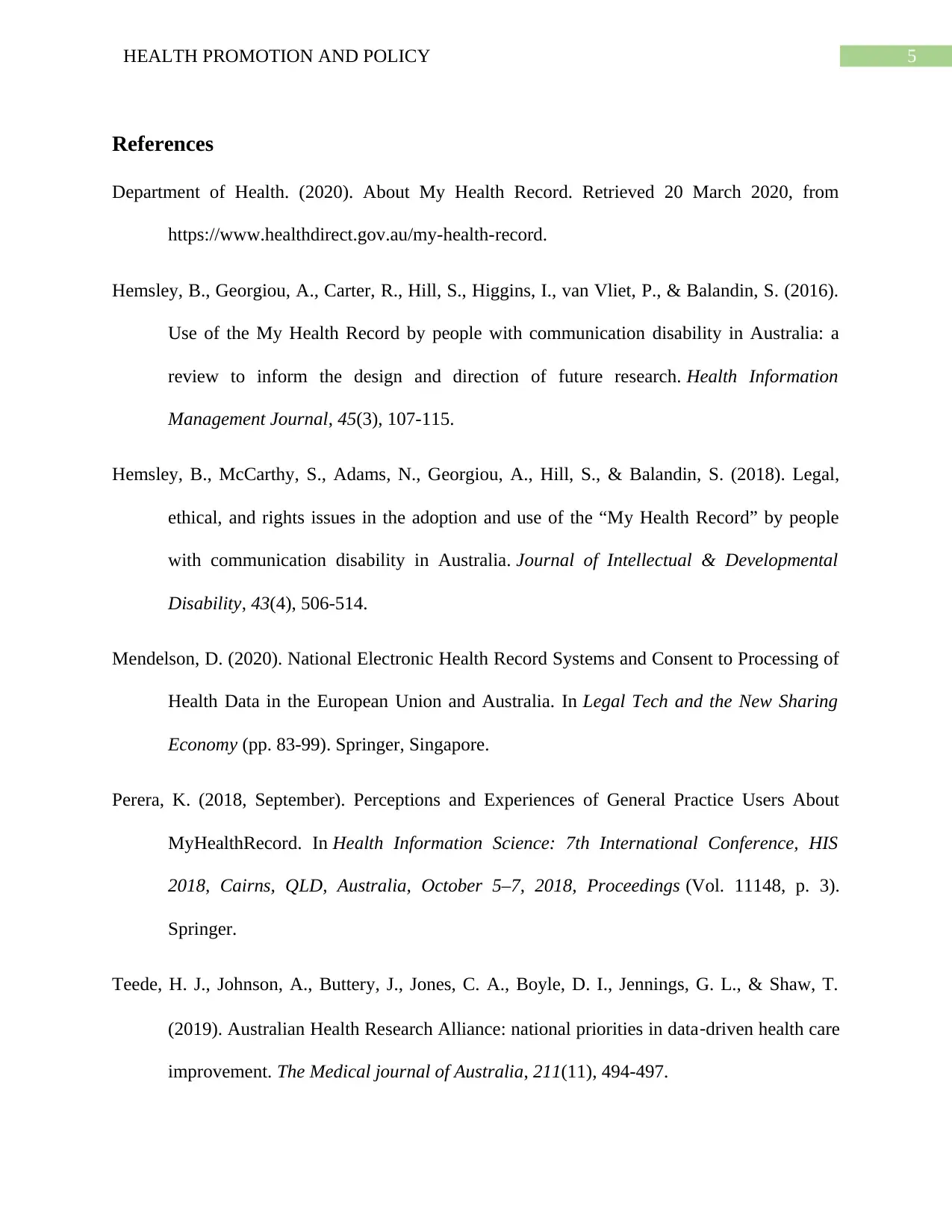
5HEALTH PROMOTION AND POLICY
References
Department of Health. (2020). About My Health Record. Retrieved 20 March 2020, from
https://www.healthdirect.gov.au/my-health-record.
Hemsley, B., Georgiou, A., Carter, R., Hill, S., Higgins, I., van Vliet, P., & Balandin, S. (2016).
Use of the My Health Record by people with communication disability in Australia: a
review to inform the design and direction of future research. Health Information
Management Journal, 45(3), 107-115.
Hemsley, B., McCarthy, S., Adams, N., Georgiou, A., Hill, S., & Balandin, S. (2018). Legal,
ethical, and rights issues in the adoption and use of the “My Health Record” by people
with communication disability in Australia. Journal of Intellectual & Developmental
Disability, 43(4), 506-514.
Mendelson, D. (2020). National Electronic Health Record Systems and Consent to Processing of
Health Data in the European Union and Australia. In Legal Tech and the New Sharing
Economy (pp. 83-99). Springer, Singapore.
Perera, K. (2018, September). Perceptions and Experiences of General Practice Users About
MyHealthRecord. In Health Information Science: 7th International Conference, HIS
2018, Cairns, QLD, Australia, October 5–7, 2018, Proceedings (Vol. 11148, p. 3).
Springer.
Teede, H. J., Johnson, A., Buttery, J., Jones, C. A., Boyle, D. I., Jennings, G. L., & Shaw, T.
(2019). Australian Health Research Alliance: national priorities in data‐driven health care
improvement. The Medical journal of Australia, 211(11), 494-497.
References
Department of Health. (2020). About My Health Record. Retrieved 20 March 2020, from
https://www.healthdirect.gov.au/my-health-record.
Hemsley, B., Georgiou, A., Carter, R., Hill, S., Higgins, I., van Vliet, P., & Balandin, S. (2016).
Use of the My Health Record by people with communication disability in Australia: a
review to inform the design and direction of future research. Health Information
Management Journal, 45(3), 107-115.
Hemsley, B., McCarthy, S., Adams, N., Georgiou, A., Hill, S., & Balandin, S. (2018). Legal,
ethical, and rights issues in the adoption and use of the “My Health Record” by people
with communication disability in Australia. Journal of Intellectual & Developmental
Disability, 43(4), 506-514.
Mendelson, D. (2020). National Electronic Health Record Systems and Consent to Processing of
Health Data in the European Union and Australia. In Legal Tech and the New Sharing
Economy (pp. 83-99). Springer, Singapore.
Perera, K. (2018, September). Perceptions and Experiences of General Practice Users About
MyHealthRecord. In Health Information Science: 7th International Conference, HIS
2018, Cairns, QLD, Australia, October 5–7, 2018, Proceedings (Vol. 11148, p. 3).
Springer.
Teede, H. J., Johnson, A., Buttery, J., Jones, C. A., Boyle, D. I., Jennings, G. L., & Shaw, T.
(2019). Australian Health Research Alliance: national priorities in data‐driven health care
improvement. The Medical journal of Australia, 211(11), 494-497.
⊘ This is a preview!⊘
Do you want full access?
Subscribe today to unlock all pages.

Trusted by 1+ million students worldwide
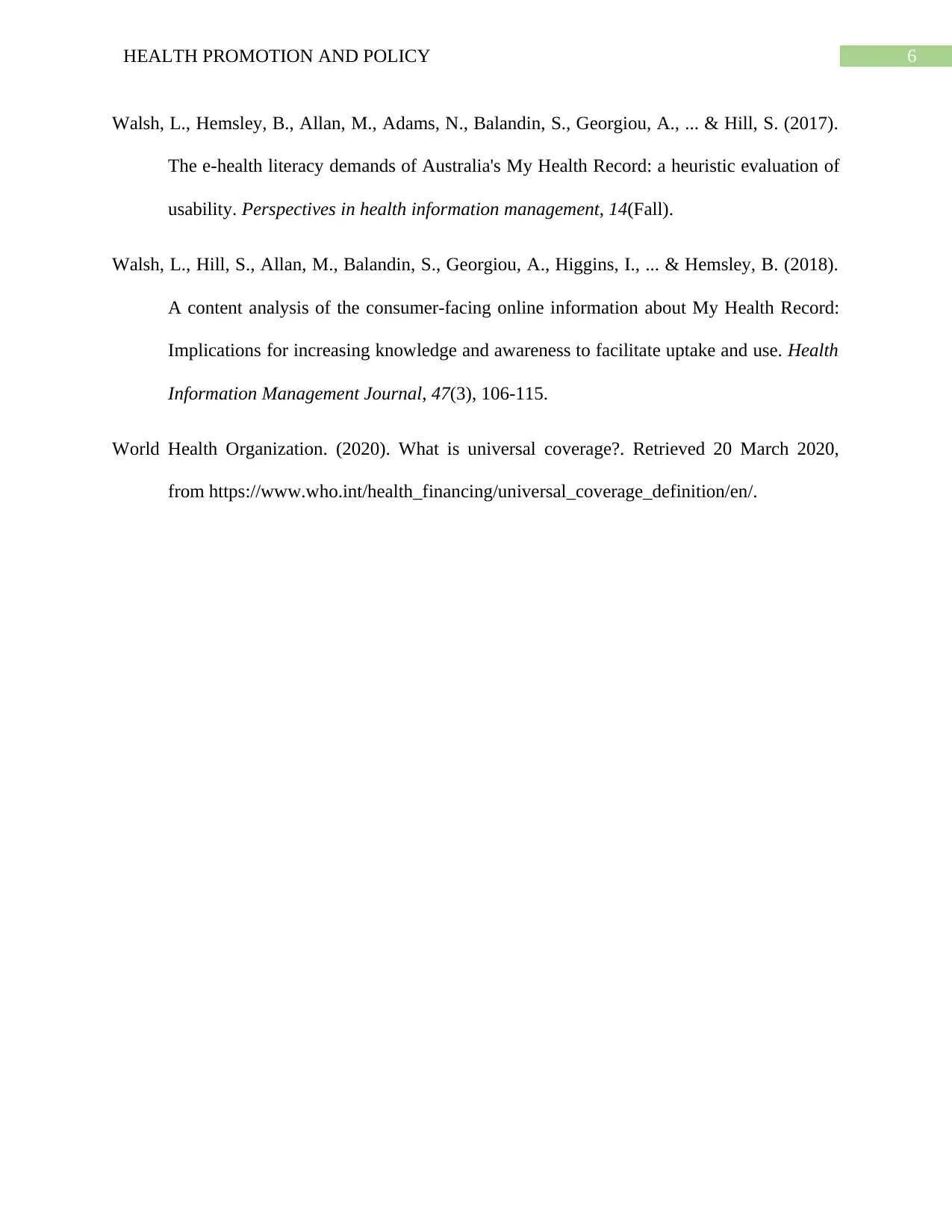
6HEALTH PROMOTION AND POLICY
Walsh, L., Hemsley, B., Allan, M., Adams, N., Balandin, S., Georgiou, A., ... & Hill, S. (2017).
The e-health literacy demands of Australia's My Health Record: a heuristic evaluation of
usability. Perspectives in health information management, 14(Fall).
Walsh, L., Hill, S., Allan, M., Balandin, S., Georgiou, A., Higgins, I., ... & Hemsley, B. (2018).
A content analysis of the consumer-facing online information about My Health Record:
Implications for increasing knowledge and awareness to facilitate uptake and use. Health
Information Management Journal, 47(3), 106-115.
World Health Organization. (2020). What is universal coverage?. Retrieved 20 March 2020,
from https://www.who.int/health_financing/universal_coverage_definition/en/.
Walsh, L., Hemsley, B., Allan, M., Adams, N., Balandin, S., Georgiou, A., ... & Hill, S. (2017).
The e-health literacy demands of Australia's My Health Record: a heuristic evaluation of
usability. Perspectives in health information management, 14(Fall).
Walsh, L., Hill, S., Allan, M., Balandin, S., Georgiou, A., Higgins, I., ... & Hemsley, B. (2018).
A content analysis of the consumer-facing online information about My Health Record:
Implications for increasing knowledge and awareness to facilitate uptake and use. Health
Information Management Journal, 47(3), 106-115.
World Health Organization. (2020). What is universal coverage?. Retrieved 20 March 2020,
from https://www.who.int/health_financing/universal_coverage_definition/en/.
1 out of 7
Related Documents
Your All-in-One AI-Powered Toolkit for Academic Success.
+13062052269
info@desklib.com
Available 24*7 on WhatsApp / Email
![[object Object]](/_next/static/media/star-bottom.7253800d.svg)
Unlock your academic potential
Copyright © 2020–2026 A2Z Services. All Rights Reserved. Developed and managed by ZUCOL.





